Web 2.0 workplaces [PICS]
Web 2.0 is special. And so are the places that make it happen.
Here's how the offices of web 2.0 companies look like. I've also added descriptions to each site in case you've been living in a bubble and don't know what they do.

Loved and hated by many and founded in march of 2006, Twitter is a social networking and micro-blogging site that allows users to post their latest updates. An update is limited by 140 characters and can be posted through three methods: web form, text message, or instant message.
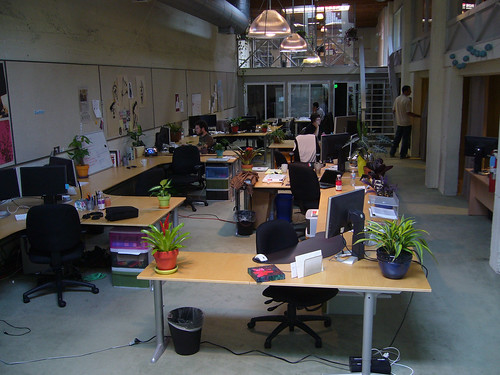
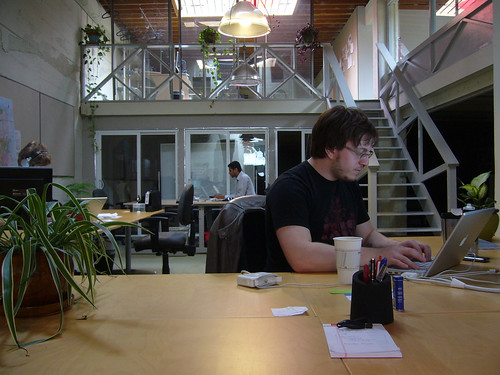
The Twitter door.


The social network of the moment. On February 4th, 2004 Mark Zuckerberg launched The Facebook, a social network that was at the time exclusively for Harvard students. It was a huge hit, in 2 weeks, half of the student body at Harvard had signed up. Other schools in the Boston area began demanding a Facebook network. Zuckerberg immediately recruited his friends Dustin Moskowitz and Chris Hughes to help build Facebook, and within four months, Facebook added 30 more college networks.
With this success, Zuckerberg, Moskowitz and Hughes moved out to Palo Alto for the summer and rented a sublet. A few weeks later, Zuckerberg ran into the former cofounder of Napster, Sean Parker. Parker soon moved in to Zuckerberg's apartment and they began working together. Parker provided the introduction to their first investor, Peter Thiel, cofounder of PayPal and managing partner of the Founders Fund. Thiel invested $500,000 into Facebook.
And big Facebook was born.


Mark putting some to-do items in the impossible whiteboard behind the cabinet

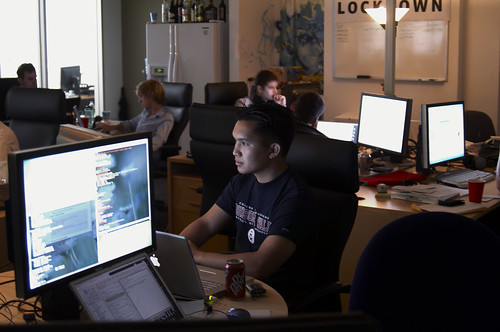

Digg is a user driven social content website. Everything on Digg is user-submitted. After you submit content, other people read your submission and "Digg" what they like best. If your story receives enough Diggs, it's promoted to the front page for other visitors to see.
In the fall of 2004, Kevin Rose came up with the idea for Digg. He found programmer Owen Bryne through eLance.com and paid him $10/hour to develop the idea. In addition, Rose paid $99 per month for hosting and $1,200 for the Digg.com domain. In December of 2004, Kevin launched his creation to the world through a post on his blog.

Craigslist is a man's online classifieds that anyone can use. It cuts straight to the chase without all the frills, and without crying while still telling you that "everything is okay". Everyone appreciates this, because when you want to find a free box of computer parts from 1995 or an apartment in NYC, you need something that just works.



Mozilla is an open-source software project that uses a community-based approach to develop and provide applications such as the Firefox web browser and Thunderbird email client.
Firefox is possibly the safest and most sophisticated web browser in existence to date. Its drawing appeal and wonderful security is an essential for any desktop, laptop or notebook owner.




Joost is a p2p on demand video player that offers professional (legal) programming much like on your television, but whenever you want. With very heavy backing from media giants, Joost looks good to take on competitors.



Former game designers Stewart Butterfield and Caterina Fake created Flickr, an online photo sharing network, in 2004. Flickr, which began as a photo-sharing feature of their gaming project, has since then blossomed into one of the premire photo-sharing sites on the web. Yahoo! purchased Flickr for $35 million in March of 2005.



This service pays attention to what you listen to, in order to recommend other music that is similar, while allowing you to do the most fun activity of music, listening to it.



Founded in July 2006 by Jyri Engestrom and Petteri Kopponen, Jaiku is a micro-blogging and social networking site based in Finland. As a free service, it allows users to post thoughts, or "Jaikus," via the web or using the mobile phone. By allowing people to check their friends' posts or to update their own micro-blog stream, Jaiku can be used as a way for individuals to remain in constant contact with others. It is now part of Google.



LinkedIn allow their users to form connections with business associates whom they trust. The service can also be used to list jobs, find jobs, or even just plain talk business.



Netvibes is one of the pioneers of the personalized home page. Netvibes lets you assemble all your favorite widgets, feeds, social networks, email, videos and blogs on one fully-customizable page.



Launched in 2005, Reddit is a social news website that displays news based on your personal preferences and what the community likes. Your preferences are determined based on your history of voting stories up or down.
The company was started by two University of Virginia grads in the Y Combinator program and two others (Christopher Slowe and Aaron Swartz) later joined the team.

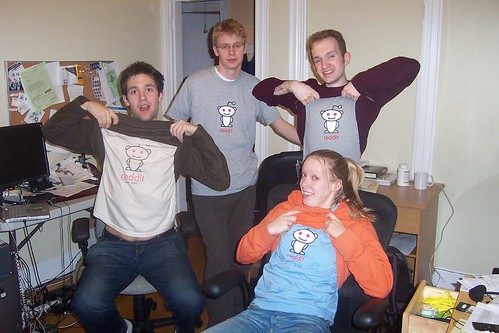

1 2
Here's how the offices of web 2.0 companies look like. I've also added descriptions to each site in case you've been living in a bubble and don't know what they do.

Loved and hated by many and founded in march of 2006, Twitter is a social networking and micro-blogging site that allows users to post their latest updates. An update is limited by 140 characters and can be posted through three methods: web form, text message, or instant message.


The Twitter door.


The social network of the moment. On February 4th, 2004 Mark Zuckerberg launched The Facebook, a social network that was at the time exclusively for Harvard students. It was a huge hit, in 2 weeks, half of the student body at Harvard had signed up. Other schools in the Boston area began demanding a Facebook network. Zuckerberg immediately recruited his friends Dustin Moskowitz and Chris Hughes to help build Facebook, and within four months, Facebook added 30 more college networks.
With this success, Zuckerberg, Moskowitz and Hughes moved out to Palo Alto for the summer and rented a sublet. A few weeks later, Zuckerberg ran into the former cofounder of Napster, Sean Parker. Parker soon moved in to Zuckerberg's apartment and they began working together. Parker provided the introduction to their first investor, Peter Thiel, cofounder of PayPal and managing partner of the Founders Fund. Thiel invested $500,000 into Facebook.
And big Facebook was born.


Mark putting some to-do items in the impossible whiteboard behind the cabinet



Digg is a user driven social content website. Everything on Digg is user-submitted. After you submit content, other people read your submission and "Digg" what they like best. If your story receives enough Diggs, it's promoted to the front page for other visitors to see.
In the fall of 2004, Kevin Rose came up with the idea for Digg. He found programmer Owen Bryne through eLance.com and paid him $10/hour to develop the idea. In addition, Rose paid $99 per month for hosting and $1,200 for the Digg.com domain. In December of 2004, Kevin launched his creation to the world through a post on his blog.

Craigslist is a man's online classifieds that anyone can use. It cuts straight to the chase without all the frills, and without crying while still telling you that "everything is okay". Everyone appreciates this, because when you want to find a free box of computer parts from 1995 or an apartment in NYC, you need something that just works.



Mozilla is an open-source software project that uses a community-based approach to develop and provide applications such as the Firefox web browser and Thunderbird email client.
Firefox is possibly the safest and most sophisticated web browser in existence to date. Its drawing appeal and wonderful security is an essential for any desktop, laptop or notebook owner.




Joost is a p2p on demand video player that offers professional (legal) programming much like on your television, but whenever you want. With very heavy backing from media giants, Joost looks good to take on competitors.



Former game designers Stewart Butterfield and Caterina Fake created Flickr, an online photo sharing network, in 2004. Flickr, which began as a photo-sharing feature of their gaming project, has since then blossomed into one of the premire photo-sharing sites on the web. Yahoo! purchased Flickr for $35 million in March of 2005.



This service pays attention to what you listen to, in order to recommend other music that is similar, while allowing you to do the most fun activity of music, listening to it.



Founded in July 2006 by Jyri Engestrom and Petteri Kopponen, Jaiku is a micro-blogging and social networking site based in Finland. As a free service, it allows users to post thoughts, or "Jaikus," via the web or using the mobile phone. By allowing people to check their friends' posts or to update their own micro-blog stream, Jaiku can be used as a way for individuals to remain in constant contact with others. It is now part of Google.



LinkedIn allow their users to form connections with business associates whom they trust. The service can also be used to list jobs, find jobs, or even just plain talk business.



Netvibes is one of the pioneers of the personalized home page. Netvibes lets you assemble all your favorite widgets, feeds, social networks, email, videos and blogs on one fully-customizable page.



Launched in 2005, Reddit is a social news website that displays news based on your personal preferences and what the community likes. Your preferences are determined based on your history of voting stories up or down.
The company was started by two University of Virginia grads in the Y Combinator program and two others (Christopher Slowe and Aaron Swartz) later joined the team.



1 2



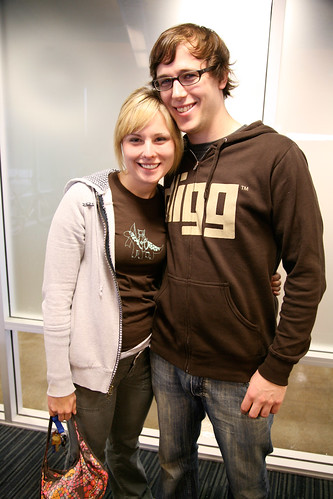
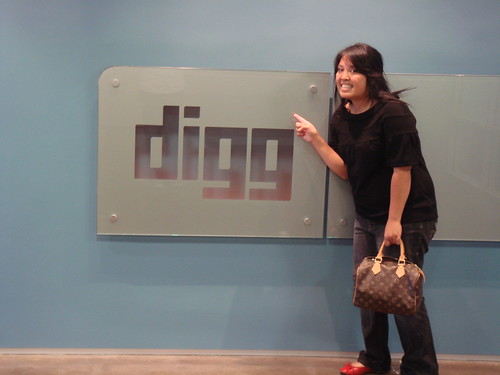



No comments:
Post a Comment